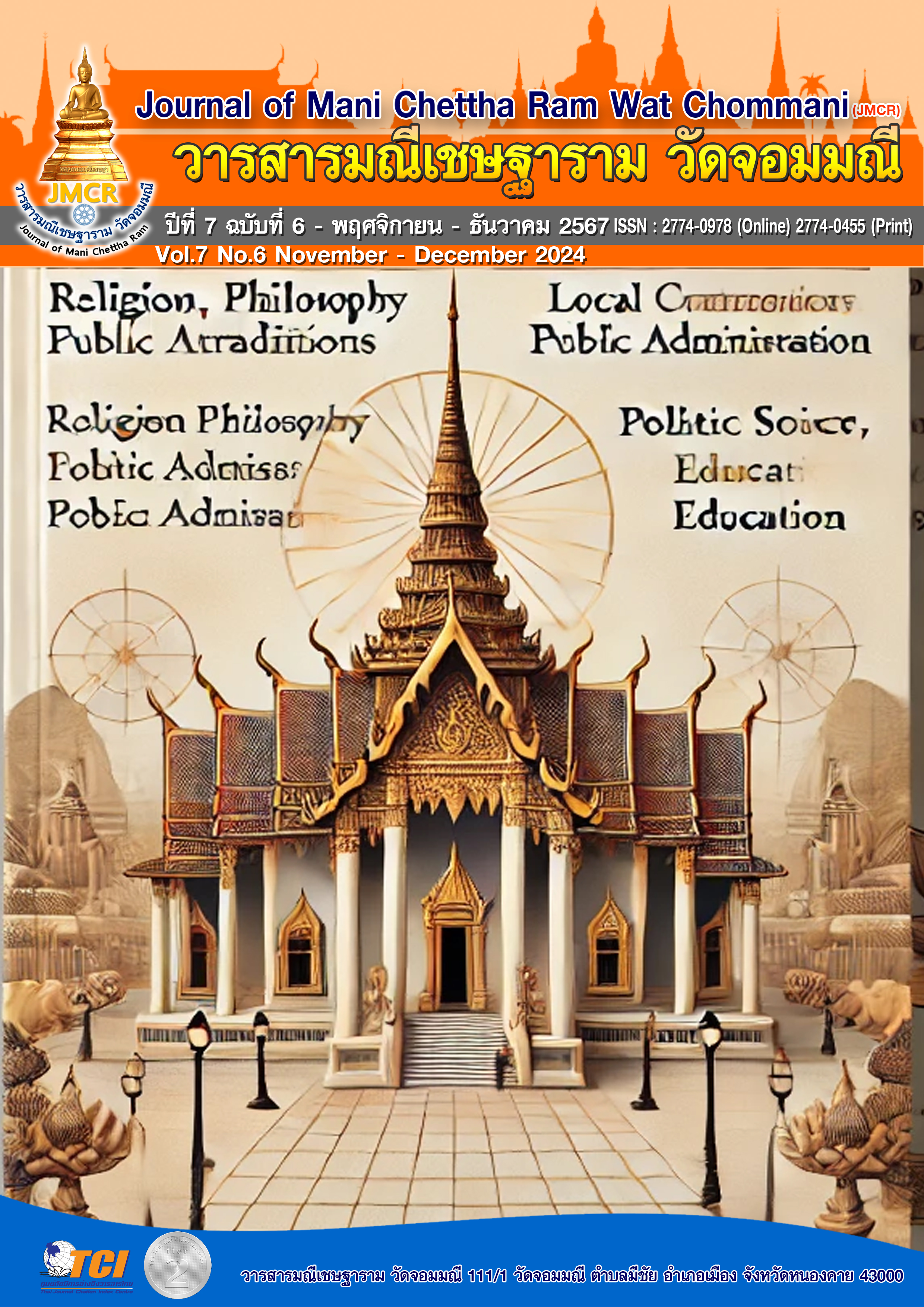A STUDY ON FAMILY AND COMMUNITY INVOLVEMENT IN EARLY CHILDHOOD EDUCATION IN CHILD DEVELOPMENT CENTERS IN LOEI PROVINCE
Keywords:
Family and community participation, Early childhood development, Child development centerAbstract
This study aimed to 1. Study the patterns and roles of family and community participation in the early childhood development process in the child development center. 2. Analyze the impact of family and community participation on the development and learning of early childhood children. 3. Propose guidelines for promoting family and community participation in the early childhood development process through sustainable mechanisms and policies. This research is a qualitative research. The population is parents, teachers, and community personnel. The sample of 10 people was selected by purposive sampling. The research instruments consisted of in-depth interviews, observations, and focus group interviews. Data collection was conducted in the area of the child development center in Loei Province. Content analysis was conducted, focusing on finding trends related to early childhood development and participation patterns in the community context.
The research results found that 1. The forms and roles of family and community participation are diverse, such as participating in activities in the child development center and the community supporting learning both at home and providing various resources to the child development center through the participation of people in the community, which helps to strengthen the relationship between the child development center, family and community very well. 2. The impact on the development and learning of early childhood children found that such participation resulted in children having better physical, emotional, social and intellectual development, such as developing communication skills, building mental stability and having positive relationships with friends, teachers and people in the community. 3. The approach to promoting family and community participation should focus on creating a collaborative network between the child development center, family and community by organizing activities that promote understanding of the role of parents, training on early childhood development and supporting policies that encourage participation for all involved in the community and at the local level. The findings from this study indicate the importance of participation as an important factor in developing the quality of life of early childhood children. Creating sustainable mechanisms and policies at the community level is therefore necessary and important in promoting long-term cooperation. Furthermore, family and community participation not only has a positive effect on children but also helps to create good and sustainable relationships between families, parents, teachers and communities, which is an important foundation for building the foundation of the early childhood development process in the future.
References
กรมอนามัย กระทรวงสาธารณสุข. (2557). คู่มือการพัฒนาเด็กปฐมวัย : แนวทางการมีส่วนร่วมของครอบครัวและชุมชนในการพัฒนาเด็กปฐมวัย. กรุงเทพมหานคร: กรมอนามัย.
สำนักวิชาการและมาตรฐานการศึกษา สำนักงานคณะกรรมการการศึกษาขั้นพื้นฐาน กระทรวงศึกษาธิการ. (2561). การพัฒนาเด็กปฐมวัยตามมาตรฐานการจัดการศึกษาขั้นพื้นฐาน. กรุงเทพมหานคร: กระทรวงศึกษาธิการ.
ธนาพูน วงค์ษา ธิติกฤศ มาเพ็ชร. (2565).การพัฒนาหลักสูตรการเรียนรู้ความเป็นพ่อแม่มืออาชีพ ต.ยางขี้นก อ.เขืองใน จ.อุบลราชธานี รายงาน สืบเนื่องจากการประชุมวิชาการระดับชาติ (Proceedings) การประชุมวิชาการระดับชาติ ราชภัฏเลยวิชาการ ครั้งที่7ประจำปี 2564. มหาวิทยาลัยราชภัฏเลย.
วิชัย วงษ์สุวรรณ. (2560). แนวทางการเสริมสร้างการมีส่วนร่วมของชุมชนในการพัฒนาเด็กปฐมวัยในศูนย์พัฒนาเด็กเล็ก. กรุงเทพฯ: สำนักพิมพ์แห่งจุฬาลงกรณ์มหาวิทยาลัย.
สำนักงานส่งเสริมการศึกษาเอกชน. (2562). บทบาทของครอบครัวและชุมชนในการพัฒนาเด็กปฐมวัย. กรุงเทพมหานคร: กรมการศึกษานอกโรงเรียน.
สำนักงานคณะกรรมการการศึกษาขั้นพื้นฐาน. (2564). นโยบายการศึกษาขั้นพื้นฐาน.สำนักงานคณะกรรมการการศึกษาขั้นพื้นฐาน.
หทัยทิพย์ ธนานุวัตร. (2561). การมีส่วนร่วมของครอบครัวและชุมชนในการพัฒนาเด็กปฐมวัย: การวิจัยเชิงคุณภาพในศูนย์พัฒนาเด็กเล็ก. วารสารการศึกษา, 12(2), 45-59.
Bronfenbrenner, U., & Morris, P. A. (2006). The bioecological model of human development. ใน Handbook of child psychology (เล่มที่ 1, หน้า 793-828).
Epstein, J. L. (2011). School, family, and community partnerships: Preparing educators and improving schools. Westview Press.
Foster, M. A. (2013). Family involvement and its effect on early childhood literacy. Early Childhood Education Journal, 41(3), 177-185.
Pianta, R. C., Barnett, W. S., Burchinal, M., & Thornburg, K. R. (2009). The effects of preschool education: What we know, how public policy is or is not aligned with the evidence base, and what we need to know. Psychological Science in the Public Interest, 10(2), 49-88.
Sheridan, S. M., Knoche, L. L., Kupzyk, K. A., Edwards, C. P., & Marvin, C. A. (2011). A randomized trial examining the effects of parent engagement on early language and literacy: The Getting Ready intervention. Journal of School Psychology, 49(3), 361-383.




